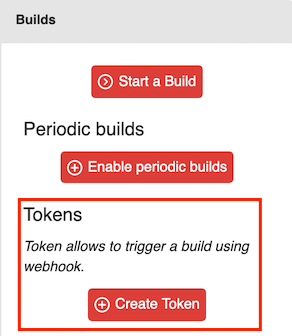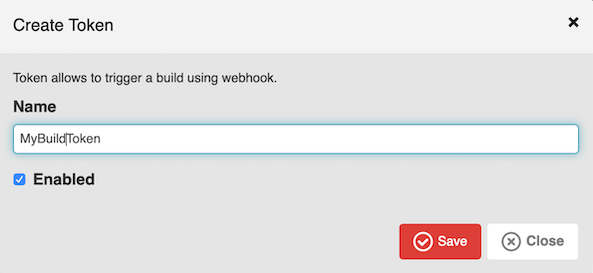Starting a Build using a Webhook
¶
Requires Production Plan
Starting a build with a webhook offers the most flexible way of triggering Blackfire scenarios based on third-party tool events (e.g. CI/CD systems, Cloud providers...). Thereby, you can add performance tests at any point of your tool-chain.
For instance, you can:
- Configure your tooling to trigger a new build after each deployment to the staging and/or production servers. It enables you to check your production configuration and your code's behavior on production machines, and validate the deployment.
- Configure your continuous integration tooling to automatically test any branch you deployed on your testing environment (e.g. with a pull-request from GitHub). You can then decide if the code is ready to be merged.
Build Tokens
¶
Build Tokens allows to trigger builds using a webhook in a secure way. It is possible to generate several Build Tokens for different purposes and to enable/disable them.
You can create Build Tokens from your Environment Builds dashboard.
In the left panel, click on the Create Token button:

Then give the Token a name. Note that you can also enable/disable it with the
help of the Enabled checkbox.

Triggering a Build With Blackfire Build-Trigger CLI Command
¶
blackfire CLI command is being installed along with the agent and
provides build-trigger sub-command.
1
blackfire build-trigger <ENDPOINT> --env=<ENV-UUID> --token=<TOKEN-VALUE>Replace <ENDPOINT> with the endpoint you want to use (overrides the default
endpoint you set in your environment settings), <TOKEN-VALUE>
by your generated token value, and <ENV-UUID> by your environment UUID.
The command supports the following options:
--env |
Your Blackfire environment UUID or name (can be part of the name if it is not ambiguous) |
--token |
Your Build Token generated value |
--title |
The title of your build |
--http-username |
The username for HTTP Basic authentication |
--http-password |
The password for HTTP Basic authentication |
--ip |
The IP for forcing DNS, if your endpoint is not in a public DNS |
--ssl-no-verify |
Disable SSL certificates verification (this is insecure) |
--external-id |
A unique identifier for the build; commonly, a unique reference from a 3rd party service (e.g. the full Git commit hash related to the build) |
--external-parent-id |
The unique identifier of the parent build, to compare the current build with (e.g. the reference full Git commit hash) |
--external-url |
A URL related to the build, like a Pull Request, or a link to your CI/CD system |
Triggering a Build With cURL
¶
You can trigger a build using a curl request:
1 2 3 4
curl -X POST https://blackfire.io/api/v2/builds/env/<ENV-UUID>/webhook \
--user "<TOKEN-VALUE>" \
-d "endpoint=<ENDPOINT>" \
-d "title=Build title"Replace <ENV-UUID> with your environment UUID, <TOKEN-VALUE>
by your generated token value, and <ENDPOINT>.
The webhook endpoint accepts the following request parameters:
user |
Your Build Token generated value |
endpoint |
The endpoint to profile |
title |
The title of your build |
http_username |
The username for HTTP Basic authentication |
http_password |
The password for HTTP Basic authentication |
ip |
The IP for forcing DNS, if your endpoint is not in a public DNS |
ssl_no_verify |
Disable SSL certificates verification (this is insecure) |
external_id |
A unique identifier for the build; commonly, a unique reference from a 3rd party service (e.g. the Git commit sha1 related to the build) |
external_parent_id |
The unique identifier of the parent build, to compare the current build with (e.g. the reference Git commit sha1) |
external_url |
A URL related to the build, like a Pull Request, or a link to your CI/CD system |
You can seamlessly generate your curl command using a form by
clicking on the Token you want to use in your Builds dashboard.
For your convenience, you can even trigger a build from there.
Builds Comparison
¶
When using builds, it is possible to compare one build to another. This is useful when you want to validate a code merge (e.g. a pull-request) by triggering a build webhook.
Builds comparison enables you to use percent() and diff() functions in your assertions.
The comparison is always made between the current build and a reference build.
If the build is triggered with Blackfire CLI, the reference build is identified with the value passed to the
--external-parent-idoption, in theblackfire build-triggercommand.Note that
--external-idoption must be set.1 2 3 4 5 6 7
blackfire build-trigger \ <ENDPOINT> \ --env=<ENV-UUID> \ --token=<TOKEN-VALUE> --title="Build PR 1234" \ --external-id=<some_unique_id_for_the_build> \ --external-parent-id=<some_unique_id_for_the_reference_build>If the build is triggered with
cURL, the reference build is identified with the value passed to theexternal_parent_idPOST parameter.Note that
external_idparameter must be set.1 2 3 4 5 6
curl -X POST https://blackfire.io/api/v2/builds/env/<ENV-UUID>/webhook \ --user "<TOKEN-VALUE>" \ -d "<ENDPOINT>" \ -d "title=Build PR 1234" \ -d "external_id=<some_unique_id_for_the_current_build>" -d "external_parent_id=<some_unique_id_for_the_reference_build>"